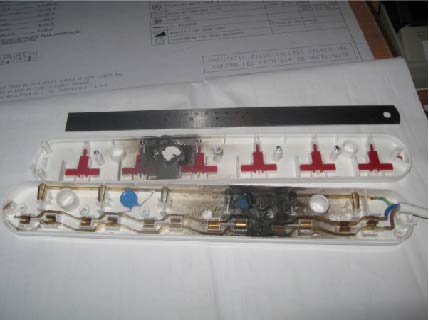Near-miss: burnt out electrical socket
A member has reported an incident in which an electrical socket caught fire. A member of the vessel crew was woken from sleep in his cabin by a popping sound. Shortly thereafter, he smelled burning. He immediately got up and saw smoke coming from a 6 way multi-socket plugged into the mains. The crew member’s mobile phone and cabin television were plugged into the 6 way multi-socket. He immediately extinguished the smouldering socket and reported the incident. There were no injuries.
An examination of the socket showed that one of the surge capacitors had blown with enough heat to burn the socket. An identical socket, which had been purchased at the same time as the one involved in the incident, seemed to be working fine. However, it was taken out of service to assist in preventing any risk of possible recurrence. It was ascertained that the 6 way multi-socket had been purchased by a member of the vessel crew from a shop in the last port visited by the vessel.

Direct and Root Causes
The direct cause of the incident was failed/defective portable electrical equipment – an oversurge of electrical current into the 6 way multi-socket caused the internal components, and external casing, to overheat and start smouldering.
The root cause was failure to follow procedures – specific procedures in place to control electrical equipment onboard the vessel were not complied with. The aim of this procedure was to ensure that all vessel electrical equipment, crew personal electrical equipment and third party project equipment is presented to the vessel electrician, prior to use on the vessel, to verify and test that it is safe and fit for purpose.
All crew and contractors are informed of this procedure during vessel induction, and portable appliance testing (PAT) equipment is available. The member of crew who purchased the 6 way multi-socket did not follow the procedure and did not present the multi-way socket to the vessel electrician. No check was made to ensure that the socket was safe for use with the vessel electrical supply. Had the socket been presented to the electrician, it would have been established that it was not suitable/compatible with the mains electrical set-up on the vessel and should not have been used.
Corrective/Preventative Actions
- A thorough electrical inspection of the cabin involved in the incident was carried out and it was found to be safe. The inspection showed that the cabin television had already been PAT tested, with testing label clearly visible and in date;
- A thorough sweep was undertaken onboard the vessel and all unsuitable multi-way sockets were removed.
Lessons Learnt
- Vessel procedures exist to ensure the safety and well-being of all persons onboard and should be complied with in order to prevent the potential for accidents/incidents;
- Although electrical items may be new and safe for use, this does not necessarily mean that they are safe to use onboard a vessel; they may possibly only be suitable for domestic/home use;
- All electrical items should be presented to the vessel electrician so that any doubt over condition or suitability for use can be addressed;
- Consideration of long-term plans to rewire vessels to remove 2-pin sockets and install 3-pin UK switched sockets throughout.
Safety Event
Published: 28 July 2010
Download: IMCA SF 05/10
IMCA Safety Flashes
Submit a Report
IMCA Safety Flashes summarise key safety matters and incidents, allowing lessons to be more easily learnt for the benefit of all. The effectiveness of the IMCA Safety Flash system depends on Members sharing information and so avoiding repeat incidents. Please consider adding safetyreports@imca-int.com to your internal distribution list for safety alerts or manually submitting information on incidents you consider may be relevant. All information is anonymised or sanitised, as appropriate.
IMCA’s store terms and conditions (https://www.imca-int.com/legal-notices/terms/) apply to all downloads from IMCA’s website, including this document.
IMCA makes every effort to ensure the accuracy and reliability of the data contained in the documents it publishes, but IMCA shall not be liable for any guidance and/or recommendation and/or statement herein contained. The information contained in this document does not fulfil or replace any individual’s or Member's legal, regulatory or other duties or obligations in respect of their operations. Individuals and Members remain solely responsible for the safe, lawful and proper conduct of their operations.
